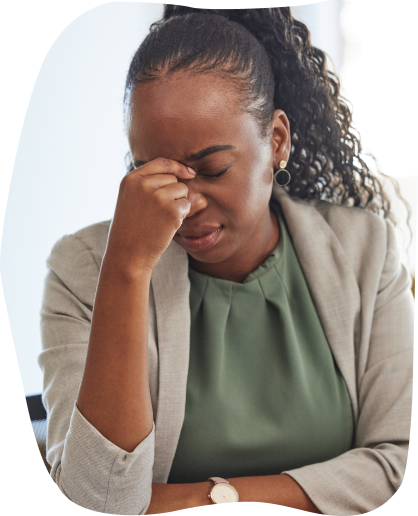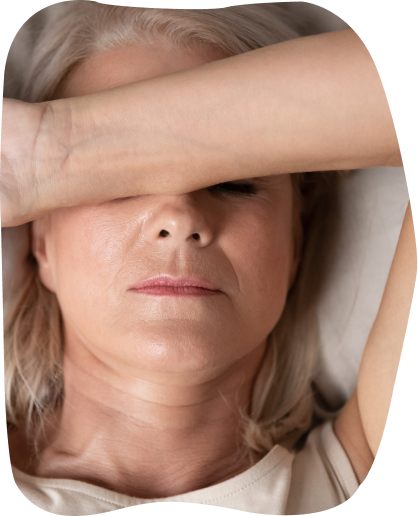Welcome to your guide to menopause. This natural life stage, marked by the end of menstrual cycles, varies for every woman. From hot flashes to mood swings, the experience can range from challenging to breezy. Our goal is to arm you with knowledge, helping you understand what to expect, manage symptoms, and maintain your mental health and confidence.
We’ll cover the physical changes, discuss symptoms, and share practical wellbeing strategies. Whether you’re approaching menopause, in the midst of it, or supporting someone who is, this guide is your resource. Let’s demystify menopause together and embrace the journey ahead.
If you’re experiencing symptoms of menopause, you may be wondering what exactly menopause is and how it happens. Well, for starters, let’s talk about what the menopausal transition is.
Menopause is a natural process that signifies the end of a woman’s fertility. It is identified by an absence of menstrual periods for a continuous span of 12 months, marking the termination of a woman’s menstrual cycle.
Menopause occurs when the ovaries stop producing eggs and hormone levels (estrogen and progesterone) begin to decline. Estrogen and progesterone are two very important hormones in a woman’s body that work together with many others to maintain optimal health.
Estrogen plays a crucial role in regulating the menstrual cycle, promoting the growth and development of female reproductive organs, and maintaining healthy bone density. It also affects other tissues throughout the body, including the brain, heart, and skin.
On the other hand, progesterone is essential for preparing and maintaining the uterus during pregnancy. It also plays a role in regulating the menstrual cycle, calming emotions and supporting healthy bone density. Without these hormones, women may experience a range of health issues such as infertility, osteoporosis, and mood changes.
Our body is wise; when it determines you’re no longer “needing” to gestate a life, the levels of estrogen and progesterone hormones naturally decline. If the body could talk, it would say something like “if there is no need to create a new life in this body, there is no need for me to generate these hormones”. The problem is that with the decrease in hormone levels, our bodies start to experience some symptoms while it adjusts to not having the same steady hormone levels as it used to. This is why women may start experiencing changes in their mood, having hot flashes, night sweats or hair loss among others that will be discussed later in detail.
Find ease to your symptoms with a menopause treatment crafter for you by expert Menopause Society Certified Doctors.
Get StartedIs important to know that menopause has different phases. These are divided into: perimenopause, menopause, and post-menopause.
Early menopause, also known as premature menopause, refers to the onset of menopause before the age of 40. But there are other factors that can lead to it for example when ovarian failure occurs before the age of 40. This can be caused by toxins such as smoking, radiation exposure, chemotherapeutic drugs, or surgery that removes the ovaries or impairs the ovarian blood supply. In the United States, the average age of menopause is 51, with the most common age to enter menopause (ie. completely stop having cycles) is between 48 to 55 years old.
Just like regular menopause, early menopause marks the end of a woman’s fertility and is confirmed after 12 consecutive months without a menstrual period. However, it often comes as a surprise and may pose additional emotional and physical challenges due to its premature timing. Women experiencing premature menopause might need to address specific health concerns such as increased risk of osteoporosis, heart disease, and certain neurological disorders earlier than their counterparts entering menopause at a more typical age.
Another form of menopause is surgical menopause, which can occur after the removal of one or both ovaries or radiation of the pelvis, including the ovaries, in premenopausal women. As a result, these women experience an abrupt menopause and often have more severe menopausal symptoms than if they had experienced menopause naturally. Premature ovarian failure is also known as primary ovarian insufficiency.
At Pandia Health, we understand that navigating through these phases can be challenging and uncomfortable. That’s why we offer a range of treatment options to manage the symptoms of menopause and help you feel like yourself again. Our team works closely with each patient to create a customized treatment plan, taking into account individual needs, preferences, and medical history. With our expert care and support, you can trust that you’re receiving the best possible care. Don’t let the symptoms of menopause control your life any longer. Take control of your health today by starting a consultation with our team and start feeling better.
Get a personolized Menopause Treatment from the comfort of your home from Pandia Health's expert doctors
Get Started
With the decline in hormone progesterone and estrogen levels, a woman’s body may experience a range of physical and emotional symptoms. We’ve detailed out a few of the mild symptoms and the most common ones below. For any additional questions or information needed be sure to check out our comprehensive guide to menopause symptoms, or contact a Pandia Health expert today!
The first way menopause can impact a woman is the effect it has on her physically. Read below for a few of the more common physical symptoms women report experiencing:
The uncontrolled drop on hormones, lack of estrogen, and the aging coupled with the change of women’s role is linked to the following emotional symptoms:
Every woman experiences menopause symptoms in a unique way, which means symptoms are not going to be the same for everyone. While some individuals may encounter very few or no symptoms, others may experience severe symptoms that negatively impact their everyday life and well-being. These symptoms can persist for several years, and in some cases never go away. The reasons for the between a person to another are mostly genetic, lifestyle factors, and health and family history. To manage symptoms, it is very important to seek medical advice to get the right treatments and avoid health risks. Pandia Health expert doctors can tailor a treatment for you to address your symptoms
At Pandia Health we understand how these symptoms can affect your daily life and have created this section to help you identify them and learn how to manage them. Our Menopause Treatment Service offers various treatment options to relieve vaginal dryness, hot flashes, night sweats and other menopause symptoms, helping you feel like yourself again.
Menopause is a natural life event and not an illness, but its onset is often associated with certain symptoms that may require medical attention. Typically, menopause can be identified when a woman has not had a menstrual period for 12 consecutive months, and there are no other underlying reasons for this change.
However, if you’re experiencing severe or unusual symptoms, it’s important to consult with a healthcare provider. This can be done in person or through telehealth platforms, like here at Pandia Health, which offer the convenience of remote consultations. Your healthcare provider may take into account your age, symptoms, and medical history in their evaluation.
Although blood tests are not typically necessary to diagnose menopause, they may be used in certain situations to measure levels of follicle-stimulating hormone (FSH) and estradiol (a type of estrogen), which can give an indication of ovarian function.
At Pandia Health, we understand that navigating menopause can be challenging and sometimes a lonely adventure. Reliable information on this topic is rather scarce and sometimes gynecological effects of menopause can be overlooked and go unaddressed.
It’s important to have a support system in place so that you can get through it with ease. We aim to provide information on the different types of support available to women during menopause. This includes support groups, counseling, and online resources.
Find ease to your symptoms with a menopause treatment crafter for you by expert Menopause Society Certified Doctors.
Get Started
Fortunately, nowadays there are numerous fantastic solutions to help ease menopause symptoms. Read on below for common treatment solutions:
Menopausal hormone therapy (MHT) also known as hormone replacement therapy (HRT) is the most effective treatment for menopause symptoms. It’s a traditional treatment that gives the body the hormones that are no longer naturally produced during this time. Giving the body the hormones it is lacking, can help alleviate many of the uncomfortable symptoms associated with menopause. HRT is prescribed in tablet, patch, and cream format.
There are two types of hormone replacement therapy:
Not all treatments include hormone replacement or supplanting hormone production. Below we have common non-hormonal treatments for menopause.
Other traditional treatments may include prescription medications to manage specific symptoms like severe hot flashes or vaginal dryness. Two of these prescription medications are Clonidine, which is a blood pressure medication, and Gabapetin, a seizure medication. Both medications are prescribed to help alleviate hot flashes.
This is a non-hormonal therapy for menopause recently approved by the FDA. It consists of a 45 mg daily oral pill to treat vasomotor symptoms such as hot flushes and night sweats.
Herbal treatments and supplements lack scientific evidence that proves their benefits for menopause symptoms. In some cases, herbal supplements can be a great support to some other menopause treatments. It is extremely important to consult your doctor before starting any herbal supplements if you are already on any other menopause treatment or are about to start one. Some menopause treatment and herbal supplements may be contraindicated.
Keeping a healthy and balanced diet together with an active life (regularly exercising) can help to improve some menopause symptoms.
Adopting a healthy lifestyle is crucial during and after menopause. Good nutrition is key: a balanced diet rich in fruits, vegetables, lean proteins, and whole grains can help manage symptoms and maintain overall health. Calcium and vitamin D are particularly important for bone health, which can be affected by the decrease in estrogen levels during menopause.
Regular exercise has numerous benefits. It can help manage weight, improve mood, promote better sleep, and maintain muscle and bone strength. Aim for a mix of cardio, strength training, and flexibility exercises.
Adequate sleep is also important. If you’re experiencing sleep disturbances, improving your sleep hygiene can be beneficial. Establish a regular sleep schedule, create a restful environment, and avoid caffeine and electronic devices before bedtime.
Regular health check-ups are essential to monitor your health status and to detect any potential health issues early.
Alternative therapies such as acupuncture or homeopathy may also provide relief to some menopause symptoms, however there is not enough scientific data to support them as an effective treatment.

The hormonal changes during menopause can lead to a variety of emotional and psychological effects. Some women may experience mood swings, anxiety, and depression. It’s important to recognize these symptoms and understand that they are a common part of the menopausal transition.
There are several strategies to help manage these mental health challenges. Regular physical activity and a healthy diet can boost your mood and energy levels. Meditation, mindfulness, and other stress-reduction techniques can help you manage anxiety and mood swings.
If you’re feeling depressed or overly anxious, it’s important to reach out to a healthcare professional. Telehealth platforms can provide access to mental health services from the comfort of your home. Remember, it’s okay to ask for help and there are resources available to support you.
Find ease to your symptoms with a menopause treatment crafter for you by expert Menopause Society Certified Doctors.
Get StartedMenopause can bring changes to your sexual health. Lower levels of estrogen can lead to vaginal dryness and discomfort during sex, and some women may experience a decrease in libido. It’s important to communicate openly with your partner about these changes and how they might affect your relationship.
There are various treatments available to address sexual health issues. Vaginal moisturizers and lubricants can help with dryness and discomfort. Menopausal hormone therapy or other medications such as Ospemifene (SERM) for the treatment of vulvovaginal symptoms and dyspareunia may also be an option. Consult with a healthcare provider to discuss the best treatment for you.
Remember, menopause is a natural phase of life and doesn’t have to negatively impact your sexual health or relationships. With open communication and the right treatments, you can maintain a satisfying sexual life during and after menopause.

Having a good understanding of menopause is key in order to start embracing this chapter of a woman’s life. Managing menopause symptoms alone can be extremely tough, that’s why we encourage you to reach out to an expert doctor to find the best treatment for your unique needs.
Our team works closely with each patient to develop a personalized treatment plan that takes into account individual needs, preferences, and health history. We encourage women to make an informed decision about their treatment options and strive to provide the best possible care to help them live their best life. If you experience menopause symptoms, know that there are available options to smoothly navigate this life’s period. Take control of your health today by scheduling a consultation with our team and enjoy a better quality of life.
Exercising regularly can help reduce the symptoms of menopause. Endorphins released during physical activity can minimize mood swings, while maintaining a healthy weight. Additionally, consuming calcium, vitamin D and phytoestrogens will also contribute to relief from your condition.
Eating more fruits and vegetables as well as drinking plenty of water are beneficial in controlling associated issues too. To complete this effective natural menopause treatment regime, it is wise to identify any triggers that may cause an increased risk of discomfort then avoid them where possible. Reducing some foods such as processed meals could be very helpful for symptom management.
Exercising regularly can help reduce the symptoms of menopause. Endorphins released during physical activity can minimize mood swings, while maintaining a healthy weight. Additionally, consuming calcium, vitamin D and phytoestrogens will also contribute to relief from your condition.
Eating more fruits and vegetables as well as drinking plenty of water are beneficial in controlling associated issues too. To complete this effective natural menopause treatment regime, it is wise to identify any triggers that may cause an increased risk of discomfort then avoid them where possible. Reducing some foods such as processed meals could be very helpful for symptom management.
Exercising regularly can help reduce the symptoms of menopause. Endorphins released during physical activity can minimize mood swings, while maintaining a healthy weight. Additionally, consuming calcium, vitamin D and phytoestrogens will also contribute to relief from your condition.
Eating more fruits and vegetables as well as drinking plenty of water are beneficial in controlling associated issues too. To complete this effective natural menopause treatment regime, it is wise to identify any triggers that may cause an increased risk of discomfort then avoid them where possible. Reducing some foods such as processed meals could be very helpful for symptom management.
Exercising regularly can help reduce the symptoms of menopause. Endorphins released during physical activity can minimize mood swings, while maintaining a healthy weight. Additionally, consuming calcium, vitamin D and phytoestrogens will also contribute to relief from your condition.
Eating more fruits and vegetables as well as drinking plenty of water are beneficial in controlling associated issues too. To complete this effective natural menopause treatment regime, it is wise to identify any triggers that may cause an increased risk of discomfort then avoid them where possible. Reducing some foods such as processed meals could be very helpful for symptom management.
Exercising regularly can help reduce the symptoms of menopause. Endorphins released during physical activity can minimize mood swings, while maintaining a healthy weight. Additionally, consuming calcium, vitamin D and phytoestrogens will also contribute to relief from your condition.
Eating more fruits and vegetables as well as drinking plenty of water are beneficial in controlling associated issues too. To complete this effective natural menopause treatment regime, it is wise to identify any triggers that may cause an increased risk of discomfort then avoid them where possible. Reducing some foods such as processed meals could be very helpful for symptom management.
Exercising regularly can help reduce the symptoms of menopause. Endorphins released during physical activity can minimize mood swings, while maintaining a healthy weight. Additionally, consuming calcium, vitamin D and phytoestrogens will also contribute to relief from your condition.
Eating more fruits and vegetables as well as drinking plenty of water are beneficial in controlling associated issues too. To complete this effective natural menopause treatment regime, it is wise to identify any triggers that may cause an increased risk of discomfort then avoid them where possible. Reducing some foods such as processed meals could be very helpful for symptom management.
Exercising regularly can help reduce the symptoms of menopause. Endorphins released during physical activity can minimize mood swings, while maintaining a healthy weight. Additionally, consuming calcium, vitamin D and phytoestrogens will also contribute to relief from your condition.
Eating more fruits and vegetables as well as drinking plenty of water are beneficial in controlling associated issues too. To complete this effective natural menopause treatment regime, it is wise to identify any triggers that may cause an increased risk of discomfort then avoid them where possible. Reducing some foods such as processed meals could be very helpful for symptom management.
Exercising regularly can help reduce the symptoms of menopause. Endorphins released during physical activity can minimize mood swings, while maintaining a healthy weight. Additionally, consuming calcium, vitamin D and phytoestrogens will also contribute to relief from your condition.
Eating more fruits and vegetables as well as drinking plenty of water are beneficial in controlling associated issues too. To complete this effective natural menopause treatment regime, it is wise to identify any triggers that may cause an increased risk of discomfort then avoid them where possible. Reducing some foods such as processed meals could be very helpful for symptom management.
Exercising regularly can help reduce the symptoms of menopause. Endorphins released during physical activity can minimize mood swings, while maintaining a healthy weight. Additionally, consuming calcium, vitamin D and phytoestrogens will also contribute to relief from your condition.
Eating more fruits and vegetables as well as drinking plenty of water are beneficial in controlling associated issues too. To complete this effective natural menopause treatment regime, it is wise to identify any triggers that may cause an increased risk of discomfort then avoid them where possible. Reducing some foods such as processed meals could be very helpful for symptom management.
Exercising regularly can help reduce the symptoms of menopause. Endorphins released during physical activity can minimize mood swings, while maintaining a healthy weight. Additionally, consuming calcium, vitamin D and phytoestrogens will also contribute to relief from your condition.
Eating more fruits and vegetables as well as drinking plenty of water are beneficial in controlling associated issues too. To complete this effective natural menopause treatment regime, it is wise to identify any triggers that may cause an increased risk of discomfort then avoid them where possible. Reducing some foods such as processed meals could be very helpful for symptom management.